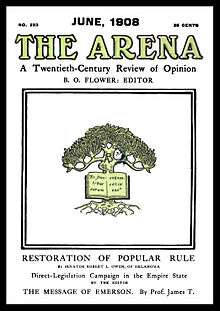The Arena (magazine)
The Arena was a liberal literary and political magazine published by Arena Publishing Co. in Boston, Massachusetts. It was founded by Benjamin Orange Flower in 1889[1] and existed for twenty years. Though it had a circulation of more than 30,000 at one point, it was rarely profitable. The final issue was published in August 1909.[2]

Publication history
The Arena was established by Benjamin Orange Flower in December 1889. The magazine was a monthly with volumes typically consisting of six issues.[3]
The magazine advocated social reform, featuring articles about poverty, slums, sweatshops, child labor, and other social problems.[1] It openly advocated birth control, free silver, agrarian reform, the single tax, and trust-busting. It was the only journal of national import to support William Jennings Bryan in 1896. Later, it advocated penal reform and opposed capital punishment.[4]
It published work by writers such as Upton Sinclair, Stephen Crane[5] and Hamlin Garland. Women wrote a quarter of the contents during its first twenty volumes. A section of Garland's Main-Travelled Roads first appeared in The Arena.[6] The Arena later employed investigative journalists and became known as a muckraker. The magazine published articles on socialism and was supportive of efforts to organize workers into trade unions. It favored literature that supported the poor and powerless.[2]
Footnotes
- Smith, Susan Harris and Dawson, Melanie, Editors. The American 1890s: A Cultural Reader Duke University Press (2000), p. 273. Retrieved July 29, 2013
- The Arena Archived 2013-08-03 at the Wayback Machine Spartacus Educational. Retrieved July 29, 2013
- "Arena," in International Magazine Co., Periodicals, vol. 1, no. 1 (Oct.-Dec. 1917), pg. 8.
- Lake, Randall A. "'WOMAN IN JOURNALISM' – CIRCA FEBRUARY-OCTOBER, 1897". "SHE FLIES WITH HER OWN WINGS" THE COLLECTED SPEECHES OF ABIGAIL SCOTT DUNIWAY (1834-1915). Retrieved 1 February 2016.
- Wertheim, Stanley. A Stephen Crane Encyclopedia, Westport, CT: Greenwood Press (1997), p. 109.
- Pizer, Donald. Hamlin Garland, Prairie Radical: Writings from the 1890s. Chicago: University of Illinois Press (2010), p. 14 ISBN 978-0252035098
External links
| Wikimedia Commons has media related to The Arena (magazine). |
- The Arena. Boston: Arena Publishing Co., 1889-1909 at Internet Archive Vol. 1 | Vol. 2 | Vol. 3 | Vol. 4 | Vol. 5 | Vol. 6 | Vol. 7 | Vol. 8 | Vol. 9 | Vol. 10 | Vol. 11 | Vol. 12 | Vol. 13 | Vol. 14 | Vol. 15 | Vol. 16 | Vol. 17 | Vol. 18 | Vol. 19 | Vol. 20 | Vol. 21 | Vol. 22 | Vol. 23 | Vol. 24 | Vol. 25 | Vol. 26 | Vol. 27 | Vol. 28 | Vol. 29 | Vol. 30 | Vol. 31 | Vol. 32 | Vol. 33 | Vol. 34 | Vol. 35 | Vol. 36 | Vol. 37 | Vol. 38 | Vol. 39 | Vol. 40 | Vol. 41 |
- The Arena at HathiTrust